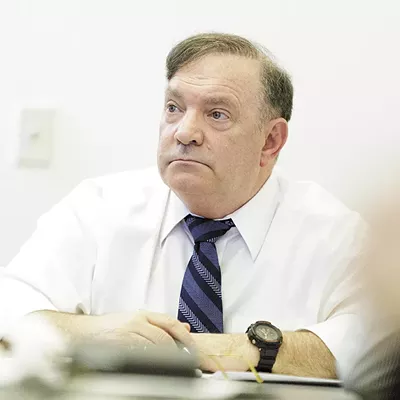The Spokesman-Review is a firm believer in full disclosure, at least for most people. Just last Friday, for example, it ripped into Idaho state and railroad officials for not being forthcoming enough about the facts behind a diesel fuel leak at Post Falls. "The facility was built in the first place on the strength of railroad executives' assurances that the spill brings into question," the editorial pointed out with justified indignation. "Candor is needed now."
The Spokesman-Review has similarly lectured the county government, School District 81, the Catholic Church -- practically everybody in the community at one time or another. But there's one exception.
In eight years of arguing over River Park Square, a controversy built upon the confusion of missing facts, Spokesman-Review editors have not once suggested full disclosure as a remedy. Worse than that, the editors at the Review did their share to prevent full disclosure. They reined in reporters who wanted to tell too much. They shouted down citizens who raised legitimate questions. They stood by silently while River Park Square lawyers filed lawsuits aimed at suppressing discussion.
To be fair, most of this happened under a different set of editors than is in charge now. But that excuse is wearing thin. With the settlement accepted by the city council earlier this month, citizens are perplexed. They never intended to bankroll a shopping mall, but they ended up doing just that. What happened?
In a word, secrecy happened. What people were told about River Park Square was one thing. What was in the legal documents was another.
Eight years ago, bond attorney Roy Koegen, speaking before the city council, explained the deal thus: "In no way does the resolution authorize bonds of the city of Spokane nor in any fashion does it authorize any city of Spokane revenues, tax, parking or otherwise, to pay back the bonds that are again authorized by a nonprofit corporation."
On Jan. 13, 1997, Betsy Cowles assured the city that "garage revenue that will repay those bonds." She added: "[T]he HUD loan guarantee and the bond financing, it's all a mechanism of financing a project with some assistance from the public sector. But it is all repaid by private money."
All repaid by private money. That is what citizens understood. The reality was that those garage revenues were an inside joke. Even the consultants who made up the slick study on parking knew the figures were inflated. Even if the garage revenue had not been vastly over-estimated, the price the city paid for the garage, based upon a fanciful appraisal, was so inflated that it could never have supported itself.
This would have been the sorrow of private investors if the deal had been as it was represented, a matter of private capital. But that, too, was a fiction. On Nov. 27, 1997, the city's lawyers, Jim Sloane and Stan Schwartz, sent this signal to the city council: "We believe that this loan could be structured in such a fashion to provide the city with greater security, through for example, a letter of credit or certain restructuring in the documents. However, this has been resisted and represented as impossible by the developer."
That warning seven years ago was the ultimate source of the present city council's agonized vote on Dec. 11. The city had no recourse if Betsy Cowles decided not to pay the loan.
Perhaps taxpayers may have felt differently about the deal if they understood this. But the memo from Sloane and Schwartz was stamped "Confidential." Taxpayers had a second chance to learn the obligation they were under when someone in City Hall leaked the memo to a Spokesman-Review reporter. The reporter wanted to publish it, but editors of the Spokesman-Review decided to keep the secret.
When John Talbott was elected mayor in 1997, he suspected there was a problem. He went to Washington, D.C., to talk to federal officials about any dangers to the city's Community Block Grant Development funds. For raising these questions, Spokesman-Review editor Chris Peck accused Talbott of "blowing smoke" to confuse citizens. "This isn't leadership. This is civic terrorism," Peck wrote. "The money to repay is all there and then some."
Unfortunately, it turned out to be Peck who was blowing smoke. Spokane's poorest neighborhoods lost $1.5 million because of the loophole Talbott suspected.
Other council members questioned the risk to the city in financing of the project. For publicly questioning the city's involvement, Cherie Rodgers, Steve Eugster and Steve Corker were all sued by Betsy Cowles. It's a tactic called a "SLAPP Suit," an acronym that means "Strategic Lawsuits Against Public Participation." The very threat of such suits helped guard the secrets behind River Park Square.
Does any of this bother the editors who were so exercised over a lack of facts in the diesel spill?
Six days after the council accepted the settlement, the Spokesman-Review editorial page got around to the issue of River Park Square. The editorial, entitled "Public-Private Projects Still Worthy," suggested: "We need to keep old animosities from derailing economic development strategies that could be the key to a more prosperous future."
Perhaps true, but, as the Spokesman-Review would no doubt respond to a similar dodge from those who spilled the diesel fuel, what might happen in the future is not the issue. Candor is needed -- now.
William Stimson is a journalism professor at Eastern Washington University.
Publication date: 12/30/04

















